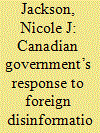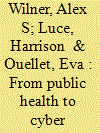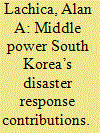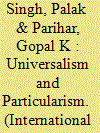|
|
|
Sort Order |
|
|
|
Items / Page
|
|
|
|
|
|
|
| Srl | Item |
| 1 |
ID:
185227


|
|
|
|
|
| Summary/Abstract |
In recent years, governments have considered how to respond to “disinformation.” However, there is little academic literature on Canada’s response in the area of security and foreign policy. This paper addresses this gap by analyzing how and why Canadian government foreign and security actors have “securitized” foreign disinformation. It argues that, since 2014, they have increased awareness about disinformation and transformed it into a matter of “security” through rhetoric and discursive framing, as well as stated policy intentions and actions. This has occurred in response to perceived threats, but without coherent policy. The findings suggest that challenges are linked to persistent difficulties in defining and understanding disinformation. The result has been fragmented actions, some of which may legitimate actions that deviate from “normal political processes.” The implications are that definitional challenges need to be addressed, the role of security actors assessed, and a clearly articulated and holistic strategy drawn.
|
|
|
|
|
|
|
|
|
|
|
|
|
|
|
|
| 2 |
ID:
185228


|
|
|
|
|
| Summary/Abstract |
There is growing consensus that Canada needs to “do more” in the Indo-Pacific region as it becomes the centre of gravity in a changing international landscape—a landscape challenging several traditional assumptions about the nature and configuration of global power which Canadian foreign policy has rested upon for decades, specifically due to the emergence of Sino-American rivalry. It is clear Canada needs a regional approach which is rooted in and better informed by geopolitical considerations, but there remains an absence of analytical frameworks to compare and evaluate alternative approaches. In addressing this void, this paper sketches out and compares four possible orientations Canada could pursue towards the Indo-Pacific region: Minimal Engagement, US-Aligned Confrontation, Regional Multilateralism, and Selective Minilateralism. Remaining agnostic about which one(s) Canada should choose, the paper is designed to highlight the stark trade-offs Canada must increasingly confront as it navigates this uncertain environment.
|
|
|
|
|
|
|
|
|
|
|
|
|
|
|
|
| 3 |
ID:
185225


|
|
|
|
|
| Summary/Abstract |
The COVID-19 pandemic has ushered in a wave of cyberattacks targeting the healthcare sector, including against hospitals, doctors, patients, medical companies, supply chains, universities, research laboratories, and public health organizations at different levels of jurisdiction and across the public and private sectors. Despite these concerns, cybersecurity in Canadian healthcare is significantly understudied. This article uses a series of illustrative examples to highlight the challenges, outcomes, and solutions Canada might consider in addressing healthcare cybersecurity. The article explores the various rationales by which Canadian healthcare may be targeted, unpacks several prominent types of cyberattack used against the healthcare sector, identifies the different malicious actors motivated to conduct such attacks, provides insights derived from three empirical cases of healthcare cyberattack (Boston Children’s Hospital [2014], Anthem [2015], National Health Service [2017]), and concludes with lessons for a Canadian response to healthcare cybersecurity from several international perspectives (e.g., Australia, New Zealand, the UK, Norway, and the Netherlands).
|
|
|
|
|
|
|
|
|
|
|
|
|
|
|
|
| 4 |
ID:
185223


|
|
|
|
|
| Summary/Abstract |
Middle powers tend to display their expertise in areas where they possess a significant advantage, and this results in the creation of new international norms, especially on non-security issues. Disaster response is one area of international relations where middle powers project their images as good international citizens. This article discusses how middle power South Korea has displayed good international citizenship through its various contributions to global disaster response, such as participation in search and rescue operations, management and coordination of relief operations, and funding for humanitarian emergencies. South Korea’s involvement in disaster response is a middle power behaviour that demonstrates good international citizenship by allocating resources for global public goods. South Korea has utilized disaster response as part of its public diplomacy to promote its identity as a middle power and in seeking recognition as a reliable contributor to international development and stability.
|
|
|
|
|
|
|
|
|
|
|
|
|
|
|
|
| 5 |
ID:
185224


|
|
|
|
|
| Summary/Abstract |
This paper analyzes the conflictual relation that the concepts of “Universalism” and “Particularism” share and how the debate informs our understanding of human rights. To study the concept further, the paper takes the case of the current COVID-19 pandemic to explore the tensions and possible assimilations between universalistic and particularistic frameworks using empirical evidence to explore the intersectional impact on human rights in current times.
|
|
|
|
|
|
|
|
|
|
|
|
|
|
|
|
| 6 |
ID:
185229


|
|
|
|
|
| Summary/Abstract |
A connected battlespace aims to enable seamless, real-time connectivity between various military assets across all domains of contemporary warfare. Such a program, however, cannot be accomplished without the use of space-based assets that are designed to store and transmit data; enable communications, surveillance, and imagery; and bolster interoperability between different military forces and services. Given recent technological advancements, coupled with international interest and the diminishing cost of launching satellites into low Earth orbit, this article explores the opportunities and drawbacks associated with the Canadian Armed Forces’ embrace of novel space-based technologies. Following dozens of consultations and a stakeholder workshop held with academic, industry and policy experts, we argue that developing, procuring, and exploiting these capabilities is essential for Canada’s future force development, augmenting situational awareness in a pan-domain environment, and retaining a degree of sovereignty in an era marked by disruptive technologies, strategic uncertainty and great power competition.
|
|
|
|
|
|
|
|
|
|
|
|
|
|
|
|
|
|
|
|
|